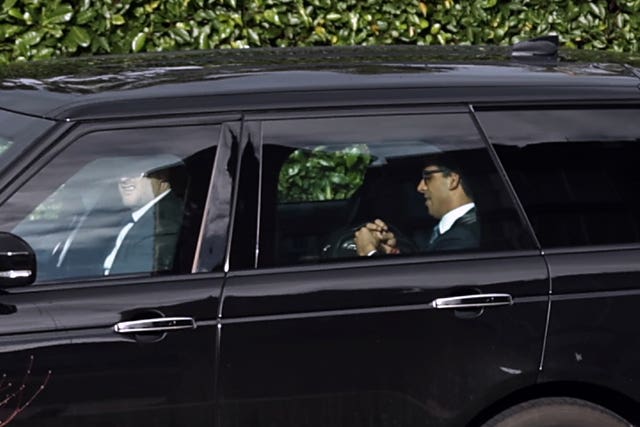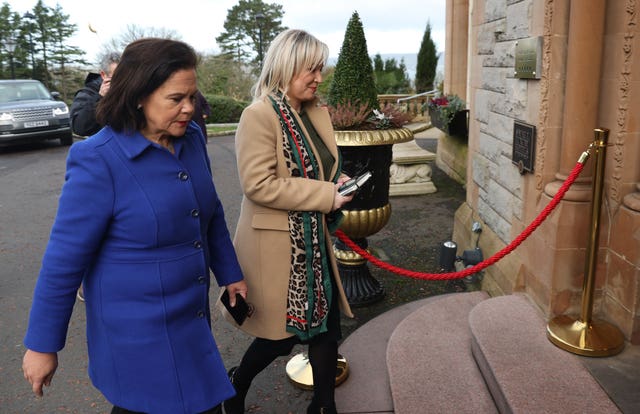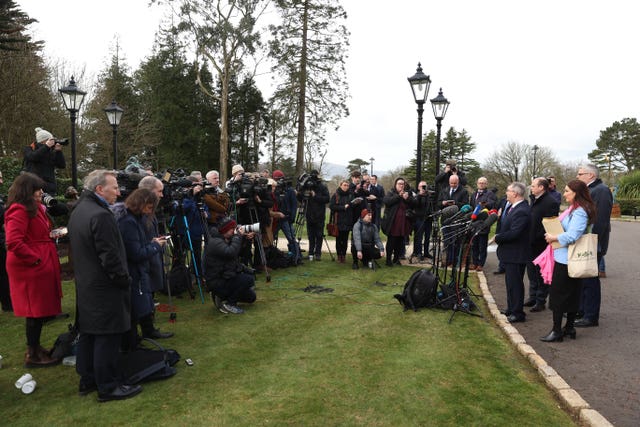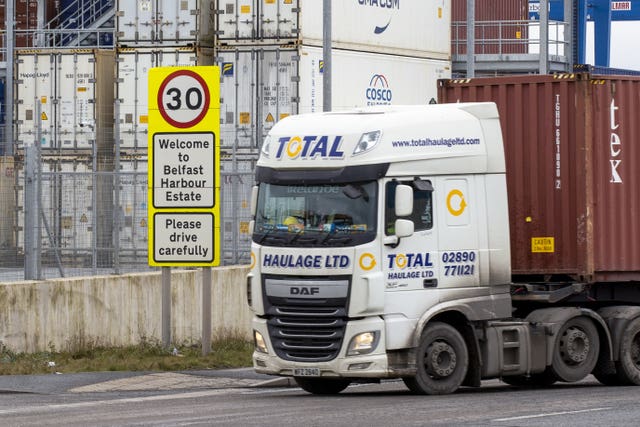The leader of the DUP has expressed hope that the UK and EU can strike a deal that addresses unionist concerns about Brexit’s Northern Ireland Protocol.
Commenting after meeting Prime Minister Rishi Sunak in Belfast, Sir Jeffrey Donaldson said it appeared “real progress” had been made in negotiations between London and Brussels, but he cautioned that more work was needed to get a final deal “over the line”.
Mr Sunak met with the leaders of the five main Stormont parties on Friday amid mounting speculation that the Government and European Commission are on the cusp of unveiling an agreement on the contentious Irish trading arrangements.

The UK and the EU have been engaged in substantive negotiations over the workings of the protocol, which was included in the Withdrawal Agreement to ensure the free movement of goods across the Irish land border after Brexit.
The protocol instead created economic barriers on trade being shipped from Great Britain to Northern Ireland.
It has proven to be deeply unpopular with unionists, who claim it has weakened Northern Ireland’s place within the UK, and the DUP has used a Stormont veto to collapse the powersharing institutions in protest at the arrangements.
The immediate future of devolution at Stormont therefore rests on whether or not the DUP is content with any new protocol deal.
“Clearly this is a big moment, the next generation of Northern Ireland and its people requires us all, I think, collectively to use our best efforts – particularly the Prime Minister and the European Commission president – to get these issues resolved and to get to a place where the political institutions can be restored,” Sir Jeffrey said.
“The decisions that will be taken by the Prime Minister and by the European Commission will either consign Northern Ireland to more division or they will clear a path towards healing and to the restoration of the political institutions.”

Mr Sunak’s meeting with the DUP at the Culloden Hotel on Friday lasted significantly longer than his engagements with the other four parties, Sinn Fein, Alliance, the Ulster Unionists and SDLP.
It is understood the DUP were involved in separate discussions with No 10 officials as well. The party also held talks with the Prime Minister on Thursday evening.
Following his visit to Northern Ireland, Mr Sunak is set to join European leaders in Germany this weekend for the Munich Security Conference and the protocol is likely to feature in discussions on the margins.
There is intensifying speculation that a deal between the EU and UK could be unveiled early next week.
In another apparent sign of progress, Foreign Secretary James Cleverly travelled to Brussels on Friday for a meeting with European Commission vice president Maros Sefcovic – an encounter both politicians described as “constructive”.
Giving his assessment on Friday, Irish premier Leo Varadkar said “we’re not there yet” on a deal but added that he was “quietly confident” there could be an agreement within a fortnight.
Sir Jeffrey said the timing of any deal was less important than its contents.
“I am not focused on timescales here, I am fundamentally focused on getting this right,” he said.
The MP said any deal had to meet the seven tests his party has set out to measure efforts to remove barriers created by the protocol.
“We need to see an agreement that delivers that, we’re hopeful that can happen,” he said.
“But, in the end, we will wait to see the final text to make our judgments as to whether, in fact, that has been delivered.”

Sir Jeffrey said the Prime Minister had offered “some clarity” on some of the main issues up for negotiation with the EU.
“It’s not for me to characterise where the EU and the UK have got to in their negotiations,” he added.
“I will simply say that on some very important issues I think there has been real progress, but there remain some outstanding issues that that we need to get over the line. We will then examine the final text of any agreement and come to our decision.”
After meeting with Mr Sunak, Sinn Fein president Mary Lou McDonald said there were clear signs of progress on the protocol and that it was “very much game on”.
“It’s clear now that significant progress has been made and we’re very heartened by that,” she said.
“I think we’ve all seen, in recent weeks certainly, an upping of the pace of political engagement and activity.
“That, to our mind, is a very, very positive thing. It’s absolutely necessary that there is intensive goodwill, good faith work done between the parties.”

She said that she believed Mr Sunak was in Northern Ireland “to see what everybody thinks and to listen to all perspectives”.
“He accepts that the core of the protocol has worked and he has expressed the need to negotiate and to figure out how to resolve those parts that need a smoother application, or, as he put it, ‘the parts that weren’t working’,” she said.
“There’s no doubt, the protocol is a consequence of Brexit and the protocol is necessary, and the Prime Minister is in absolutely no doubt of that.”
A number 10 spokeswoman said the Prime Minister met the Northern Ireland parties as part of an “engagement process”.
She added: “Whilst talks with the EU are ongoing, ministers continue to engage with relevant stakeholders to ensure any solution fixes the practical problems on the ground, meets our overarching objectives, and safeguards Northern Ireland’s place in the UK’s internal market.”
Held a constructive meeting with @MarosSefcovic in Brussels.
We discussed the work ongoing between 🇬🇧 and 🇪🇺 to find a solution on the NI Protocol
Intensive work continues.
— James Cleverly🇬🇧 (@JamesCleverly) February 17, 2023
Senior figures within the DUP and the European Research Group of the Tory party have warned that any deal must address the oversight role the protocol affords the European Court of Justice (ECJ) in Northern Ireland, as well as dealing with trading difficulties.
While it is understood the EU and the UK are close to signing off a deal that would reduce protocol red tape on the movement of Great Britain goods whose end destination is Northern Ireland, there is no expectation that Brussels is willing to agree to end the application of EU law in the region.
The EU says a fundamental plank of the protocol – namely that Northern Ireland traders can sell freely into the European single market – is dependent on the operation of EU rules in the region.
In Brussels, Mr Cleverly described his meeting with Mr Sefcovic as “constructive”.
“We discussed the work ongoing between the UK and EU to find a solution on the NI Protocol. Intensive work continues,” he tweeted.
Mr Sefcovic also said there had been “constructive engagement” and that “good progress” had been made.
“The shared objective clear: joint solutions, responding to the everyday concerns of people in NI. Hard work continues,” he tweeted.




Comments: Our rules
We want our comments to be a lively and valuable part of our community - a place where readers can debate and engage with the most important local issues. The ability to comment on our stories is a privilege, not a right, however, and that privilege may be withdrawn if it is abused or misused.
Please report any comments that break our rules.
Read the rules here